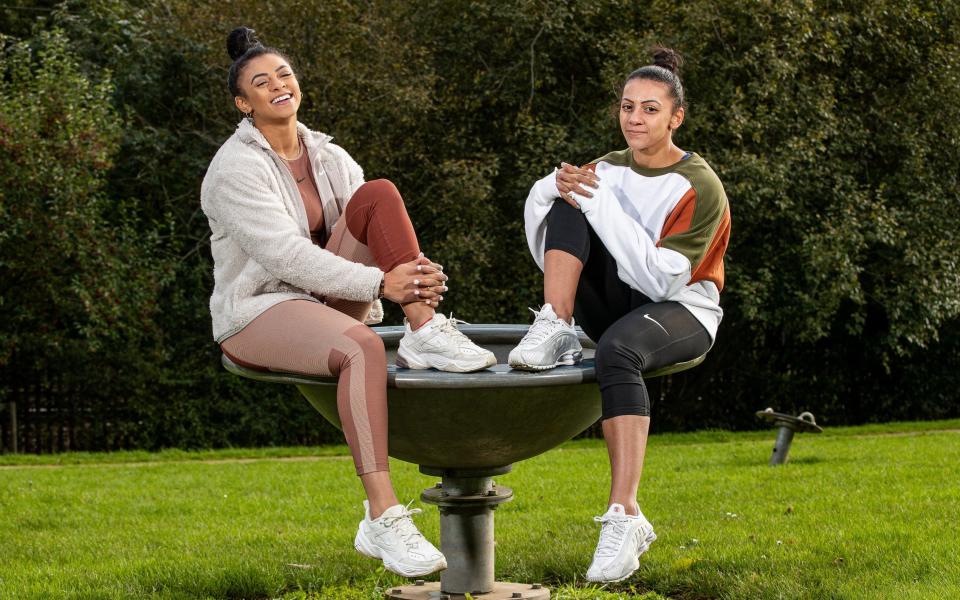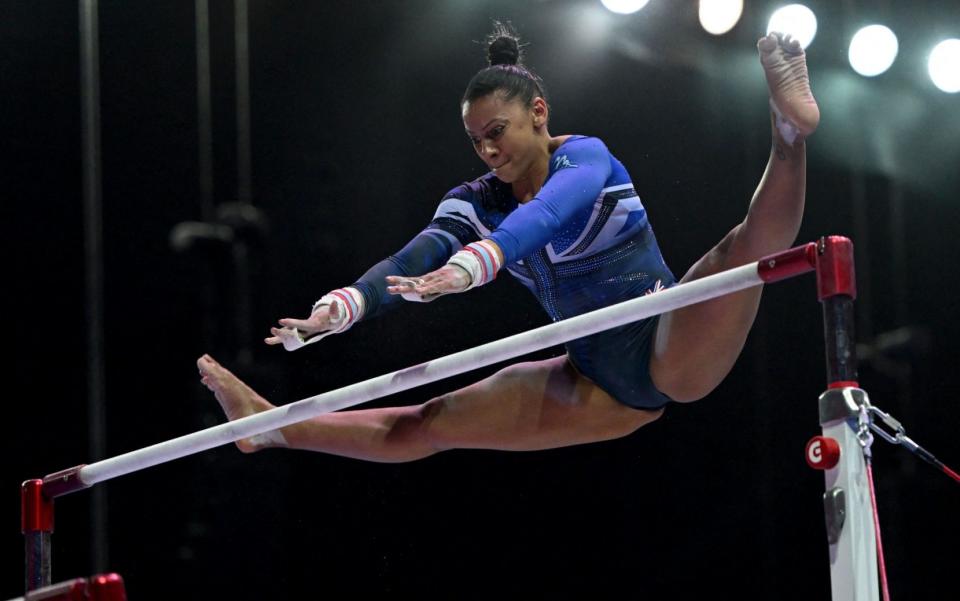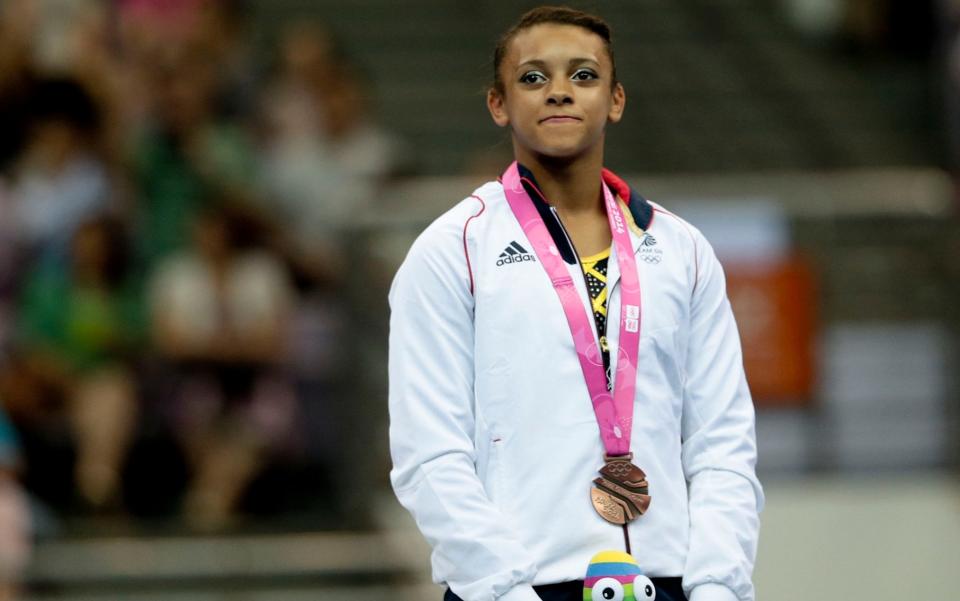Becky and Ellie Downie: ‘We’ve changed gymnastics forever’

When Becky and Ellie Downie got the call from their mother that they had received some very official-looking post, the pair assumed the worst. “I thought it might be a parking ticket,” Becky says, laughing.
The Downies could be forgiven for anticipating bad news. In the past few years, good news has been hard to come by. So to hear they were being awarded MBEs in the New Year Honours List was a welcome surprise. The sisters were recognised for their services to the sport of gymnastics and also for their services to gymnasts. They say that second point, referring to how they were the first active members of the British team to speak out about a culture of abuse in gymnastics, was incredibly validating.
“Speaking out in any situation you always go with your heart to do what’s right, but it’s human nature to second guess: ‘Did I do the right thing?’ ” Ellie says. “We go off evaluation from other people, so to have it on this scale is crazy.”
It is only a year since world bronze medallist Ellie quit the sport aged 23. She took that decision in part because, in the aftermath of disclosing emotional abuse and body-shaming by coaches, she claimed she felt “punished” by some within the British team set-up.
Older sister Becky, who turns 32 this month, is still aiming to make the Olympic team in Paris this summer, in what would be her dream ending to a career that spans two decades.

She says that receiving an MBE is personally gratifying, but feels “a bit weird” considering she is still working within the same environment on which she blew the whistle in 2020.
“I think people respect what we have done, but I still feel like I’m the bad person because of it, if that’s the right way to put it,” she says, treading carefully. “I keep reminding myself I did do a good thing. Coaches that I don’t know too well or younger athletes and parents come up to you and thank you. But the people you work with all the time, [with] those people it still feels like I was the bad one sometimes. I’m hoping that this will start to sway opinions. As time goes on, people will start to see the impact.”
To describe the Downies’ relationship with British Gymnastics as rocky over the past 3½ years would be an understatement.
When an avalanche of abuse allegations hit the governing body in the summer of 2020, Becky and Ellie were the only active national team members to join the chorus of ex-gymnasts claiming to have experienced emotional abuse.
It helped spark calls for what turned into a £3 million inquiry into British Gymnastics, which found “systemic” abuse in the sport, experienced by children as young as seven.
British Gymnastics has since been following the recommendations set out by that Whyte Review in 2022, with an aim to reform the sport’s culture. Included in its 40-point action plan was publishing a list of banned coaches last year, and in November it finally introduced a policy that blocks coaches from weighing gymnasts under the age of 10. For athletes aged 11 to 18, only a sports science or medical practitioner is now permitted to weigh them, and would require the consent of the gymnast themselves as well as a parent or guardian.
“I thought that was a massive step in the right direction,” says Ellie, who experienced body-shaming first-hand. “I’m not entirely sure why it’s taken so long for a rule like that to be put in place. They have to be careful about who they are employing, because I had a lot of issues with the nutritionist I worked with. If it was back in my day and this rule was in place, then there are still some little loopholes. But the baseline of the rule is fantastic.”

As Ellie mentions, criticism remains around the speed of change within the sport. Last month the Gymnasts for Change lobbying group questioned the independent complaints process, which is run by Sport Resolutions, and said it was “not fit for purpose” as it failed to ban a single coach over the past 18 months. (At the time, British Gymnastics acknowledged its frustrations and said it would continue to work with the group to inform its actions.)
Becky says there are positive things happening within gymnastics, too, and, as someone still training daily, she is encouraged by how it has evolved before her eyes. “Being fair to BG, they are trying to put rules in across the whole country, so decisions I imagine are not being made lightly. Ultimately we’re going in the right direction, and that is really good.
“What I see in training gyms now compared to when I grew up in the sport, it’s just not the same. Gymnasts are happier. We see kids eating in the gym, they’re encouraged to take drinks around with them. There were points where we were told we shouldn’t really be drinking too much because it makes you heavy. To know we have been able to have an impact on that change, it just means everything.”
Ellie has happily settled into life after elite sport. She is a pilates instructor at a studio in Birmingham and says it is “a lot less stressful” than trying to win Olympic medals. She has not yet convinced Becky to join her at a class, but is banking on her being a regular once she finally hangs up her leotard at the end of 2024.
Becky is not done just yet though and, if she can achieve her goal of finally winning a medal at her third Olympics, it will be quite a comeback story.
Last April she made her return to a major championships after a two-year absence by winning a European silver medal on the uneven bars – her specialist event – and gold in the team event. It was a major milestone for her, after a debilitating Achilles rupture in June 2022.

The Downies’ story goes beyond the physical hurdles though. Their family was hit by tragedy on the eve of the Olympic team trials in 2021, as they learnt that their 24-year-old brother Josh had died suddenly due to an undiagnosed heart condition. It was devastating. Then, a few weeks later, Becky was controversially left out of the Olympic team, despite battling through her grief to attend a trial at a later date.
Those memories linger, but Becky is grateful that there will be no Olympic trial ahead of Paris. Selection will instead be made this May based on a number of lead-up competitions, where she intends to compete across all four apparatus – vault, uneven bars, balance beam and floor.
Sixteen years on from her first Olympics in Beijing, and considering the heartbreak she has endured, Becky’s relentless determination to compete is quite remarkable. Knowing how intertwined their experiences have been, Ellie says she is in awe of her elder sister’s resilience.
At nearly a decade older than the rest of the current women’s team, Becky has been counted out many times before, but she remains steadfast in the belief that her best could still be yet to come.
“The last three years have been the worst of my life,” Becky says. “I really want to enjoy the last year of my career. Getting the MBE made me feel like whatever happens, if I make Paris – final, medal or not – those results, people remember them but sport quickly moves on to the next thing. Whereas what we did, we’ve changed gymnastics forever. It means absolutely everything. Now, I feel like I have nothing to lose.”

 Yahoo Sports
Yahoo Sports 
